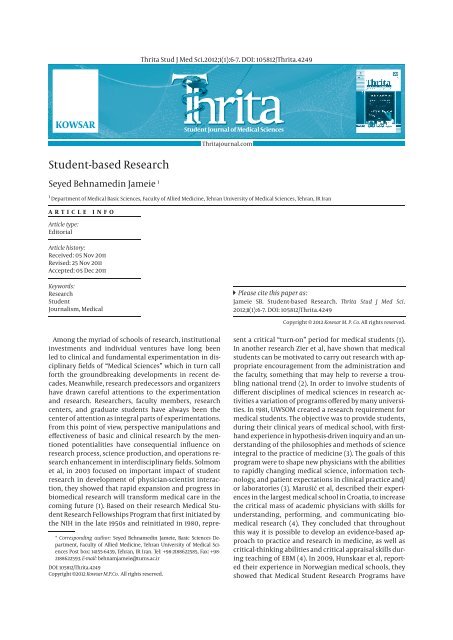by Author Index by Keywords - Index of
by Author Index by Keywords - Index of
by Author Index by Keywords - Index of
Create successful ePaper yourself
Turn your PDF publications into a flip-book with our unique Google optimized e-Paper software.
KOWSAR<br />
Student-based Research<br />
Seyed Behnamedin Jameie 1<br />
Student Journal <strong>of</strong> Medical Sciences<br />
Thritajournal.com<br />
1 Department <strong>of</strong> Medical Basic Sciences, Faculty <strong>of</strong> Allied Medicine, Tehran University <strong>of</strong> Medical Sciences, Tehran, IR Iran<br />
ARTICLE INFO<br />
Article type:<br />
Editorial<br />
Article history:<br />
Received: 05 Nov 2011<br />
Revised: 25 Nov 2011<br />
Accepted: 05 Dec 2011<br />
<strong>Keywords</strong>:<br />
Research<br />
Student<br />
Journalism, Medical<br />
Among the myriad <strong>of</strong> schools <strong>of</strong> research, institutional<br />
investments and individual ventures have long been<br />
led to clinical and fundamental experimentation in disciplinary<br />
fields <strong>of</strong> “Medical Sciences” which in turn call<br />
forth the groundbreaking developments in recent decades.<br />
Meanwhile, research predecessors and organizers<br />
have drawn careful attentions to the experimentation<br />
and research. Researchers, faculty members, research<br />
centers, and graduate students have always been the<br />
center <strong>of</strong> attention as integral parts <strong>of</strong> experimentations.<br />
From this point <strong>of</strong> view, perspective manipulations and<br />
effectiveness <strong>of</strong> basic and clinical research <strong>by</strong> the mentioned<br />
potentialities have consequential influence on<br />
research process, science production, and operations research<br />
enhancement in interdisciplinary fields. Solmom<br />
et al, in 2003 focused on important impact <strong>of</strong> student<br />
research in development <strong>of</strong> physician-scientist interaction,<br />
they showed that rapid expansion and progress in<br />
biomedical research will transform medical care in the<br />
coming future (1). Based on their research Medical Student<br />
Research Fellowships Program that first initiated <strong>by</strong><br />
the NIH in the late 1950s and reinitiated in 1980, repre-<br />
* Corresponding author: Seyed Behnamedin Jameie, Basic Sciences Department,<br />
Faculty <strong>of</strong> Allied Medicine, Tehran University <strong>of</strong> Medical Sciences<br />
Post box: 14155-6439, Tehran, IR Iran. Tel: +98-2188622585, Fax: +98-<br />
2188622593. E-mail: behnamjameie@tums.ac.ir<br />
DOI: 105812/Thrita.4249<br />
Copyright c 2012 Kowsar M.P.Co. All rights reserved.<br />
Thrita Stud J Med Sci.2012;1(1):6-7. DOI: 105812/Thrita.4249<br />
Please cite this paper as:<br />
Jameie SB. Student-based Research. Thrita Stud J Med Sci.<br />
2012;1(1):6-7. DOI: 105812/Thrita.4249<br />
Copyright c 2012 Kowsar M. P. Co. All rights reserved.<br />
sent a critical “turn-on” period for medical students (1).<br />
In another research Zier et al, have shown that medical<br />
students can be motivated to carry out research with appropriate<br />
encouragement from the administration and<br />
the faculty, something that may help to reverse a troubling<br />
national trend (2). In order to involve students <strong>of</strong><br />
different disciplines <strong>of</strong> medical sciences in research activities<br />
a variation <strong>of</strong> programs <strong>of</strong>fered <strong>by</strong> many universities.<br />
In 1981, UWSOM created a research requirement for<br />
medical students. The objective was to provide students,<br />
during their clinical years <strong>of</strong> medical school, with firsthand<br />
experience in hypothesis-driven inquiry and an understanding<br />
<strong>of</strong> the philosophies and methods <strong>of</strong> science<br />
integral to the practice <strong>of</strong> medicine (3). The goals <strong>of</strong> this<br />
program were to shape new physicians with the abilities<br />
to rapidly changing medical science, information technology,<br />
and patient expectations in clinical practice and/<br />
or laboratories (3). Marušić et al, described their experiences<br />
in the largest medical school in Croatia, to increase<br />
the critical mass <strong>of</strong> academic physicians with skills for<br />
understanding, performing, and communicating biomedical<br />
research (4). They concluded that throughout<br />
this way it is possible to develop an evidence-based approach<br />
to practice and research in medicine, as well as<br />
critical-thinking abilities and critical appraisal skills during<br />
teaching <strong>of</strong> EBM (4). In 2009, Hunskaar et al, reported<br />
their experience in Norwegian medical schools, they<br />
showed that Medical Student Research Programs have


